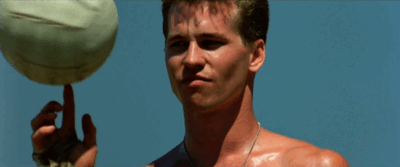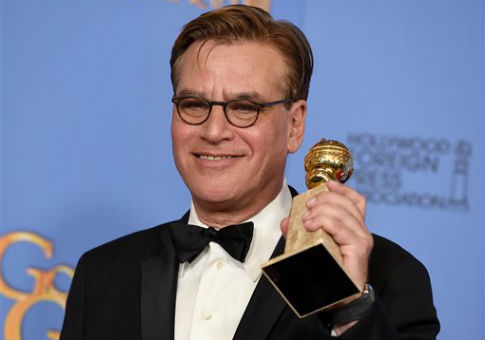It’s that time of the year again. The air is getting cooler and crisper everywhere except our nation’s capital, the leaves are changing color up north, and people are drinking cider somewhere, probably. Parents are heading to malls and hypermarkets to buy hoodies and jeans and composition books and Trapper Keepers and mechanical pencils (do people still use those?). Pensive youths are mourning the end of summer and brooding over lost loves.
The kids are headed back to school. This year I have decided to join them by signing up for "Aaron Sorkin Teaches Screenwriting" on Masterclass.com, a platform that also allows you to learn singing from Christina Aguilera, acting from Kevin Spacey (or Dustin Hoffman: they are separate classes), writing from James Patterson, photography from Annie Leibovitz, and what is called "the art of performance" from Usher. The ultimate goal of the course is to compose an original or adapted screenplay and pitch it to real filmmakers.
In a way this is sort of a dream come true for me. Like many teenagers, I went through a period when I wanted to be a filmmaker. I would often lie awake at night imagining what my films would be like: wistful, melancholic coming-of-age romances filled with lingering shots of the sea. Think the plots of Éric Rohmer’s shorts with Jane Campion cinematography. It's a rather specific Netflix category.
But the dreams of youth die when there are mouths to feed. These days I know exactly what kind of film I want to write: a beat-for-beat contemporary remake of a late-80s franchise featuring a diverse cast. After an intense brainstorming session with longtime collaborators, it was decided that I should pursue Top Gun. Unfortunately, I do not yet own the rights to this 1986 Paramount classic, so I had to come up with a few work-arounds. The provisional title of my screenplay is Peak Shot; instead of "Maverick," the Tom Cruise character will be called "Cowboy." One of the many things I learned in class is that it is okay to write with specific actors in mind. In the role of Cowboy, I see Andrew Rannells of The Book of Mormon and Girls fame. Chiwetel Ejiofor will step into Kelly McGillis’s shoes as "Chuck." I think Charlize Theron would make a good Snow Cone (read: "Iceman"), Allison Williams a stellar Swan (read: "Goose"), and Gaby Hoffmann a first-rate Gandalf (read: "Merlin"). It might be naughty of me, but I even decided that Lana Del Rey should be the one to cover "Highway to the Danger Zone" for the opening credits.

Like any college course, my Masterclass involves both attendance at lectures and homework. I have to watch 35 Sorkin-taught lessons, all of which seem to have been filmed on the same day (he wears the same grey sweater vest over the same white shirt white button-down collar in all of them and his hair never seems to change either). His lectures are full of wise koans such as "Like any other art form, there are parts of [screenwriting] that can be taught and parts of it that can’t be" and "There are two parts to having an idea: first you have to know what an idea is and then you have to have it." He refers constantly to Aristotle’s Poetics, of which we have a summary "Cheat Sheet" full of helpful tips ("remember not to lose or confuse the audience").
Almost all my classmates seem to be budding professional screenwriters. The terms of the website don’t allow me to share any of their personal information, but a composite based on the actual profiles we upload to the site would read something like, "Hi, I am Naoimi. I have a bachelor of arts degree in pottery with a minor in communications from Oregon State University and an MFA with dual concentrations in creative nonfiction and screenwriting from the University of California, Irvine. I live with my partner Sheila and our two cats Fluff and Slutbutt in Cambridge, where she works for the local PBS affiliate and I am a mixologist at two local co-op cocktail bars. My favorite films are Breaking the Waves, Men in Black, and The Color Purple." I opt for something a bit terser.
Unlike in college, going to lectures is a breeze on MasterClass because you can sit in your bathrobe with your feet up and chain smoke right in front of your professor. I even went to class drunk a few times. Best of all, the worst part of any college class, group work, is totally optional: if you would rather forego the workshops and brood silently while suffering the pangs of genius all by your lonesome, you’re free to do so.
The workbook is a different matter. After introducing myself to my classmates, the first real assignment is a cinch. All I have to do is re-watch Butch Cassidy and the Sundance Kid and then write about my favorite film, play, and TV show—to wit, Picnic at Hanging Rock, Othello, and Sanford and Son.
But the learning curve increases sharply with number two. Here you’re supposed to come up with the first 10 pages of a screenplay based on a favorite short story. Unfortunately, Prof. Sorkin doesn’t tell us anything about the mechanics of the screenplay format—writing SCENE and FADE and CAMERA and putting all those dialogue headings in the middle of the page and using that old-time typewriter font—which means that I end up seeking help outside class. Shane Black’s script for Lethal Weapon is the primary inspiration behind my adaptation of James Joyce’s "Eveline."
It doesn’t take me very long to realize that the week I’ve allotted to the class isn’t going to be nearly enough time to digest all of Prof. Sorkin’s sage advice, much less to compose an entire screenplay. Before long I am working frantically at all hours just to push my way through the videos. About a third of them deal with The West Wing, a show about which I know almost nothing and I end up having to cram by watching the first four seasons just to understand what the significance of my teacher’s comments about season five are. Thank goodness somebody put them on YouTube. But every minute that I put into catch-up means another that I can't spend in the "writing room" we are supposed to set up based on the ones Sorkin uses when he is hashing out dialogue and scene construction for his TV shows: a long table, posters, index cards, printed-out script drafts, bottles of water, and so on—or in my case, a kitchen table, empty packs of smokes, half-finished containers of sweet potato purée, and my laptop. This is where I need to be all the time.
I find myself reverting to old college habits. I drink beer during the day and stay up late with coffee writing, trying to come up with the perfect opening scene for Peak Shot. Every single one of them is crap, in my opinion. But Sorkin doesn't have a lot of advice for those of us working on projects that are not driven by dialogue. It's also very clear that I need to do a heck of a lot more research if this thing isn't going to be a total disaster.
By the end of the week, I am only on page five and a handful of my classmates have zoomed past me, probably because they—unfairly in my opinion—have been working on their scripts for months, even years. Already some of them are practicing pitching their work and making videos and BSing together in Google Hangouts, while I am still trying to finish my snappy courtroom dialogue assignment from Lesson 18. Another week isn’t going to be nearly enough time for me to find what Professor Sorkin calls the "driveshaft" of my Peak Shot, much less to work through the complicated dynamics of structure, dialogue, character development, recognition, reversal, resolution, and all the other important buzzwords from my workbook.
Professor Sorkin, may I have an extension?
